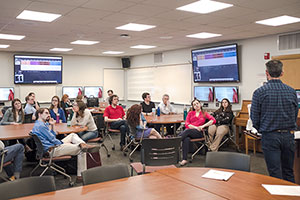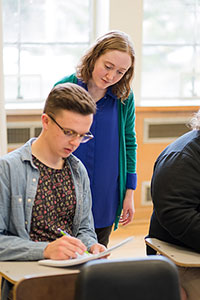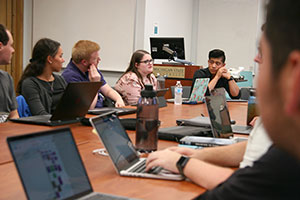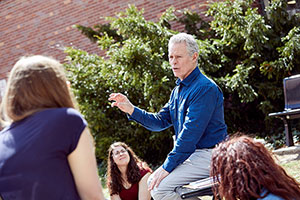- Performances & Events
- Student Resources
- Our Faculty
- Giving & Alumni
-
- All Areas
- Brass
- Composition
- Conducting
- Jazz Studies
- Keyboard
- Music Education
- Music Theory
- Musicology / Ethnomusicology
- Percussion
- Strings
- Vocal Arts
- Woodwinds
- Chamber Music
- Summer Programs
EnsemblesA wide variety of performance opportunities await our students each year, with orchestras, bands, choirs and opera, jazz nonets and combos, small ensembles, and more.
-
- Running Start
- Health, Safety, & Wellness
- Diversity and Inclusion in Music
- Entrepreneurial Musical Artist in Residence
- Jazz Artist in Residence
- Gigline
- MSU Frequency
- Carillon
- Celebrating the Spectrum
- Education Abroad
Programs & InitiativesA variety of programs and initiatives operate continuously or annually to enhance learning experiences and help students prepare for their future in music.
- News
- Community Music Schools
-
About
The MSU College of Music supports and challenges students, values innovation and creativity, and helps every community member achieve professional excellence.
- Staff/Contact


 Acting as a bi-weekly “studio class” for graduate students in music theory, the music theory colloquium brings faculty and students together to share research, discuss readings, conduct analytical roundtables, welcome guest presenters, and brainstorm about professional strategy. It is also one of the ways in which we maintain such a close-knit community among students, among faculty, and between the two.
Acting as a bi-weekly “studio class” for graduate students in music theory, the music theory colloquium brings faculty and students together to share research, discuss readings, conduct analytical roundtables, welcome guest presenters, and brainstorm about professional strategy. It is also one of the ways in which we maintain such a close-knit community among students, among faculty, and between the two. Graduate students grow as teachers through a variety of mentoring opportunities. Most directly, they work with a faculty course supervisor as part of their graduate assistantship, conversing each week about strategies for teaching, supporting, and engaging students. Graduate assistants are also observed in their classrooms at least once per semester. Furthermore, they have the opportunity to teach the large “lecture” class normally taught by faculty for a short segment each semester. And finally, as a capstone to their degree, each Master’s student presents a teaching demonstration, which simulates the teaching portion of a job interview.
Graduate students grow as teachers through a variety of mentoring opportunities. Most directly, they work with a faculty course supervisor as part of their graduate assistantship, conversing each week about strategies for teaching, supporting, and engaging students. Graduate assistants are also observed in their classrooms at least once per semester. Furthermore, they have the opportunity to teach the large “lecture” class normally taught by faculty for a short segment each semester. And finally, as a capstone to their degree, each Master’s student presents a teaching demonstration, which simulates the teaching portion of a job interview. The MSU College of Music boasts an innovative and wide-reaching program in music entrepreneurship and career services, known as Running Start. The music theory area regularly partners with Running Start to bring career-related programming to students on subjects such as writing a curriculum vitae or cover letter and networking effectively. In addition, career strategy is a regular component of our music theory colloquium, with topics suggested by both faculty members and students on a regular basis. Recent sessions have included interview strategy and writing personal statements.
The MSU College of Music boasts an innovative and wide-reaching program in music entrepreneurship and career services, known as Running Start. The music theory area regularly partners with Running Start to bring career-related programming to students on subjects such as writing a curriculum vitae or cover letter and networking effectively. In addition, career strategy is a regular component of our music theory colloquium, with topics suggested by both faculty members and students on a regular basis. Recent sessions have included interview strategy and writing personal statements. Research mentoring begins in the classroom, where students enrolled in MUS 973 (Readings in Music Theory) and MUS 971 (Pedagogy of Music Theory II) pursue independent research projects that often end up as successful conference proposals and article submissions. And the mentoring continues outside the classroom, where students work one-on-one with members of the music theory faculty on research projects of their choosing as part of independent studies. Faculty and students may even have the chance to co-author and co-present their research. Whichever path they follow, graduate students frequently propose and present this work both within and outside MSU.
Research mentoring begins in the classroom, where students enrolled in MUS 973 (Readings in Music Theory) and MUS 971 (Pedagogy of Music Theory II) pursue independent research projects that often end up as successful conference proposals and article submissions. And the mentoring continues outside the classroom, where students work one-on-one with members of the music theory faculty on research projects of their choosing as part of independent studies. Faculty and students may even have the chance to co-author and co-present their research. Whichever path they follow, graduate students frequently propose and present this work both within and outside MSU.